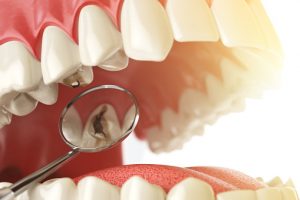 Good dental health is something we’ve all been told to stay on top of. Brushing at least twice a day has become the norm, something we try to instill in our children despite their best efforts to resist us. But this may soon become unnecessary, as researchers from the University of Alabama at Birmingham have created a molecule that prevents cavities.
Good dental health is something we’ve all been told to stay on top of. Brushing at least twice a day has become the norm, something we try to instill in our children despite their best efforts to resist us. But this may soon become unnecessary, as researchers from the University of Alabama at Birmingham have created a molecule that prevents cavities.
Cavities are caused by bacterium
Cavities are holes that develop when we don’t brush our teeth on a regular basis. It is a form of tooth decay that does not repair on its own and needs to be taken care of by a dentist. Bacteria in our mouth makes acid, and when plaque clings to your teeth, the acids eat away at the outermost layer called the enamel, leading to cavity
development.
Advertisement
About 2.3 billion people worldwide have cavities in their permanent teeth, according to a 2015 Global Burden of Disease study.
If cavities are left to erode for long enough, it can eventually reach all the way to the sensitive core. Nerve endings are found at the core and can cause severe tooth pain.
The prime bacteria involved in the tooth decay is Streptococcus Mutans, which produces a sticky biofilm that allows it to stick on to the tooth surface.
A molecule developed to prevent tooth decay
This newly developed molecule has proven to selectively inhibit the sticky biofilm of Strep. Mutans, helping to drastically reduce cavities in preclinical studies involving rats.
“Our compound is drug-like, non-bactericidal, and easy to synthesize, and it exhibits very potent efficacy in vivo. It is an excellent candidate that can be developed into therapeutic drugs that prevent and treat dental caries,” explained the researchers
Advertisement
The study in question used rat models fed a cavity-promoting diet. The rats with cavities who were fed a low-sucrose diet were infected with Strep. Mutans. Their teeth were treated with the newly developed molecule, called #G43, which caused significant reductions in cavities.
The lead investigator in the study, Hui Wu, professor of pediatric dentistry at the UAB School of Dentistry, says that targeting this causative microbiota using chemical probes to prevent their function successfully serves as a proof of concept for new and exciting future therapies. It shows promise not only in the dental setting but for other bacterial linked diseases as well.
Related: Scientists suggest pill to prevent cavities is possible
